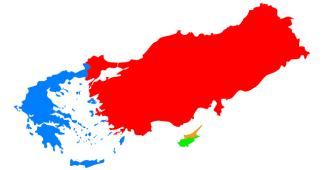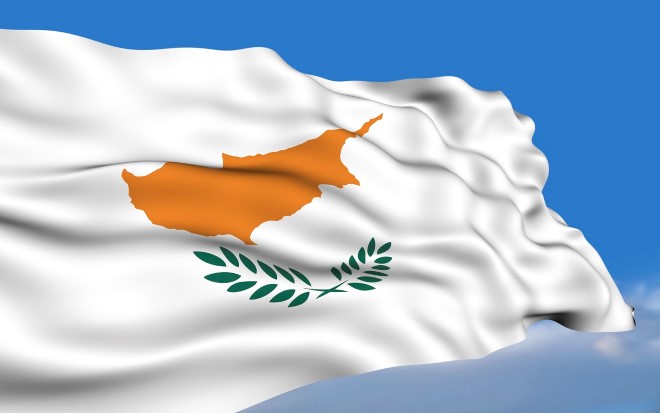William Mallinson
The compliant Greek media has recently been flaunting its America-supported relationship with Israel, dragging Cyprus into the equation, in what must seem to many like an unholy triangle of convenience. The argument runs like this: Greece wants US and Israeli support over Cyprus and the Aegean islands, whose air- and seaspace Turkey is constantly violating. Greece and Cyprus will gain American and Israeli support for its position, for supporting in return anti-Russian oil and gas projects and conducting military exercises with Israel, helping the latter to be virtually a de facto member of NATO. Greece and Cyprus thus feel safer as good servants of the anti-Russian American military-industrial-congressional complex, the essential aim of which is to control the Eastern Mediterranean, in particular its lucrative arms market. Let us however try to be a little less naïve, and look behind the scenes at the tawdry reality, rather than the jejune international relations theories of party-political designer academics and ambitious journalists.
Since at least the middle of 2010, when nine Turkish pro-Palestine peace activists were murdered by Israeli soldiers, Greece and Cyprus have been flaunting this ‘friendship’ with the Jewish State, underpinned by oil and gas interests. This has become even more intense, with the discovery of gas resources between Cyprus and Israel, while Greece is now looking at the seas south of Crete. Unlike the majority of Oxford dons, it seems that some Greek academic establishments are doing their best to nurture good relations with Israel, regardless of its barbarous and inhuman treatment of Palestinians. For example, some rather average international relations people from Panteion and Piraeus Universities have held ‘academic’ love-ins with various former Israeli defence advisors and journalists. One workshop was entitled’ Greece-Cyprus-Israel Cooperation and the New Geopolitics in the Eastern Mediterranean’, as if we are meant to assume that geopolitics, one of the oldest scourges of organised Mankind, based on greed, can become new! Hardly a day goes by without an increasingly tame Greek newspaper or channel reporting on the new situation, and how friendly Greece and Cyprus are to Israel. This whole sudden bout of bonhomie is however a naïve and dangerous dance. Let us seek a little more fact and precision.
First, the geopolitics in the Eastern Mediterranean have not altered in substance, only cosmetically. The basics are, have been, and will continue to be that the United States, and its closest ally, Israel, will continue to be inextricably intertwined, as Obama’s and Trump’s caving in to the Jewish lobby before they were elected, re-emphasised. As regards at least foreign policy, and certainly Middle Eastern policy, the US and Israel are as one. The hard-nosed reality is that Trump’s America and Netanyahoo’s Jewish state are one country, the aim of which is to control – and own – the Middle East. The so-called socialist Greek ‘government’ is aiding and abetting not only this plan, but also spitting in the face of an ever-diminishing Palestine.
Second, as regards the current fashion to show that there is a crisis in Turkish-Israeli relations, apart from an enormous amount of Turkish rhetoric, aimed at internal audiences and the Moslem world, there is no real evidence that Israel would help Greece or Cyprus in a war with Turkey, only vague words about co-operation, and back-slapping visits to Greece and Cyprus by the extreme right-wing Netanyahoo. As for Turkey, not only does it accommodate the Inçirlik NATO airbase, but has installed the NATO missile defence shield, to Iranian and Russian anger. Demonstrations in Turkey against the shield simply distract attention from the fact that the Turkish government has accepted them. Should the United States of Israel (USI) attack Iran, the Turkish position will somehow transmogrify, just as it did over Libya.
Third, Israeli policy vis-à-vis Greece and Cyprus is virtually identical, particularly on a question vital to Greece. When I asked the Israeli embassy in Athens whether the Israeli government recognised Greece’s twelve nautical mile limit and ten nautical mile airspace limit, the response was: ‘The ambassador does not wish to answer this question.’ A hardly surprising answer, since the US embassy had written to me: ‘Greece claims a six-mile territorial sea and a ten-mile territorial airspace. We recognise the six-mile territorial sea claim and a claim to the superjacent airspace. We do not recognise Greece’s claim to territorial airspace seaward of the outer limit of its territorial sea.’ In fact, although Greece is legally entitled to a twelve mile sea limit, having signed, unlike Turkey, the Law of the Sea Convention, it has not dared to implement it, since Turkey has declared such an action a casus belli.
Fourth, the US and Israel consider Cyprus, in particular the British bases, important to the defence of Israel: when Britain tried to give up its Cypriot territories following the Turkish invasion, Kissinger simply pressurised her to keep them, with the Foreign and Commonwealth Office referring to Kissinger being anxious that Britain ‘continue to occupy this square of the world chess board.’ More significantly, Kissinger was reported to be ‘concerned with the effects of United States policy over Cyprus on the resolution of the Arab/Israel problem’, regarding ‘this as more important than Greek hostility towards the United States, despite this dissension on the Southern flank of the Alliance.’ He was also concerned with the maintenance of Turkish goodwill as a bulwark between the Soviet Union and the Arab states, as well as with the continued use of US bases in Turkey.
Fifth, Israel is delighted that Cyprus and Greece are being so forthcoming and friendly. Yet it was only twenty years ago that two Mossad agents were arrested and held for spying on the sites being prepared for the – eventually abortive – arrival of Russian S-300 air defence missiles.
Sixth, an oft-ignored factor that binds Turkey and Israel tightly together is the fact that they have both been occupying territories illegally, in defiance of UN resolutions, for many years. Moreover, the Turkey-Israel military axis, initiated in the late Fifties, while not advertised, still exists, even if it may currently be on the backburner.
Seventh, Greece’s USI masters are ensuring that Greece becomes increasingly hostile towards Russia, meaning that if and when Turkey takes a Greek island or two, Russia will not lift a finger, but merely snigger at NATO’s internal dissension.
Little has changed in the Middle East, except cosmetically. Turkey is indulging in its traditional bout of muscle-flexing, two-faced diplomacy, and testing the limits of its ‘have your cake and eat it’ policy, as the S-400 saga currently demonstrates. In the meantime, those Moslem countries and movements that clearly support Palestine will no longer see Greece as a reliable supporter of a free Palestine, whatever the empty rhetoric. Greece could even become a soft target for Moslem fanatics. The US must be happy with all this, knowing that the currently supine Greek government will succumb to all kinds of pressure, including granting Israel support as it moves into the Balkans. And here is the clincher: Israel recognised the Former Yugoslav Republic of Macedonia as the ‘Republic of Macedonia’, just as the US did. Greece and Cyprus are dancing dangerously, by being cat’s paws.
It is time to be more thoughtful.
William Mallinson,
Professor of Political Ideas and Institutions,
Universitá Guglielmo Marconi
Athens, 3 May 2019
- ‘British Interests in the Eastern Mediterranean’, paper, 11 April 1975, by Western European Department, FCO 46/1248, file DPI/516/1.
- ‘British Policy on Cyprus: July to September 1974’, 14 January 1976, by Western European Department, FCO 9/2379, file WSC 020/548/1.











